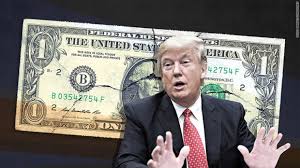Dollar hits five-week high on hawkish Fed before Jackson Hole

The U.S. dollar index hit a fresh five-week high on Monday after another Federal Reserve official flagged the likelihood of continued aggressive monetary tightening ahead of the central bank’s key Jackson Hole symposium this week.
The euro sank to a new five-week trough after Russia announced a three-day halt to European gas supplies via the Nord Stream 1 pipeline at the end of this month, exacerbating the region’s energy crisis.
China’s yuan dropped to its lowest in nearly two years after the central bank cut key lending rates, adding to a string of monetary easing measures aimed at shoring up an economy reeling from Covid-19 clampdowns and a property crisis.
The U.S. dollar index, which measures the currency against six rivals including the euro, edged up to 108.26 for the first time since July 15 and was last up 0.074% at 108.23.
That follows a gain of 2.33% last week — its best weekly rally since April 2020 — amid a chorus of Fed policymakers stressing that more needs to be done to rein in decades-high inflation.
On Friday, Richmond Fed President Thomas Barkin said the “urge” among central bankers was towards faster, front-loaded rate increases.
“Fed speakers have been stressing the message that more rate hikes are coming given the fight against inflation has not yet been won,” rattling markets ahead of Jackson Hole on Aug. 25-27, amid growing expectations for Fed Chair Jerome Powell to stress that tightening is “still a long way from the end,” Rodrigo Catril, senior FX strategist at National Australia Bank, wrote in a client note.
Money markets currently indicate 47.5% odds for another supersized 75 basis point rate hike on Sept. 21, with a 52.5% chance for a half-point rise.
Economists in a Reuters poll lean toward a 50 basis-point increase with recession risks on the rise.
Benchmark 10-year U.S. Treasury yields rose above 3% in Tokyo trading on Monday for the first time since July 21.
Against Japan’s currency, which is extremely sensitive to U.S. yields, the dollar climbed as high as 137.40 yen, the strongest since July 27.
The dollar rose as high as 6.8308 yuan in onshore trading for the first time since September 2020 after the People’s Bank of China cut the one- and five-year loan prime rates as widely expected. That came after it eased borrowing costs in a surprise move last week.
Against the offshore yuan, the dollar hit 6.8520, also the strongest level since September 2020.
Meanwhile, the euro dipped as low as $1.0026 for the first time since July 15 before trading down 0.13% at $1.0027.
Sterling fell 0.23% to $1.1805, nearing Friday’s five-week low of $1.17925.
Bundesbank President Joachim Nagel told German newspaper Rheinischen Post that the German economy, among the most exposed to disruptions in Russian gas supply, is “likely” to suffer a recession over the winter if the energy crisis continues to deepen.
But he added that even if a German recession is increasingly probable, the European Central Bank must keep raising rates to tame inflation.
Elsewhere, the Australian and New Zealand dollars sagged near five-week lows. The Aussie was little changed at $0.6876 after sliding to $0.68595 on Friday for the first time since July 19. The kiwi was flat at $0.6170 after declining to $0.61675 at the end of last week, also a first since July 19.

